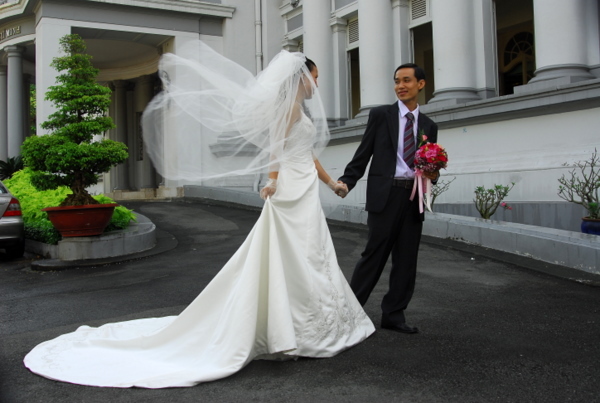Volume floats
Greetings,
A Khmer wedding lasts three days. It's LOUD. It's a monster deal.
A company arrives in a dump truck. They set up tents, tables, chairs and huge black speakers in front of an architecturally styled wedding cake home. It's happening all over town.
Speakers blast music day and night. Audible for miles. Volume shudders, shaking the terrain, setting off unemployed landmines, volcanic eruptions and destroying oil drilling operations in deep oceans. Free oil. Oceans of love, oceans of tears.
Animals run for their lives. Birds fill the sky with shrill squawks of pure terror. Panic stricken children suffer unimaginable nightmares. All the trauma counselors are celebrating with copious amounts of food and drink. Another one bites the dust. I am a dust collector.
It costs the groom's boom boom family $3,000 and up. It's a matter of EGO, social standing, imaginary wealth and appearances. They don't send out R.S.V.P. People just show up. Lots of hungry people. Friends, strangers and many animists.
Human speakers drone on and on about marriage, family and society.
Traditional singers and musicians plaintively wail at high decibels about love, suffering, happiness, fidelity, treble and bass. Contemporary hip-hop rappers take the stage with heavy metallic thumping and pumping.
100 monkeys off stage type out Shakespeare. They chatter odes, sonnets and mystifying secrets.
The insane 24/7 volume partially explains why people here speak, or more specifically yell so loud. They don't hear each other because they can't, don't, won't hear. Repeat. What? What? Repeat. Louder!
This is the Flowing holiday. Families with millions of marriageable girls are desperate to get them married. They expect their daughters to produce flowing children. It's a heavy social security reality.
They won't have the money to feed them or house them or educate them or...because those realities are far away, like stars in the sky. They'll worry about essentials later in the long now. Too many poor desperate people will have to sell their children facing immediate financial reality.
As a serious Chinese university student, filled with humility, compassion and serenity said, "Human life here is cheap."
The main problem now is raising $3,000 minimum. If you want to play you have to pay.
No please, no squeeze.
Metta.








 Share Article
Share Article 




